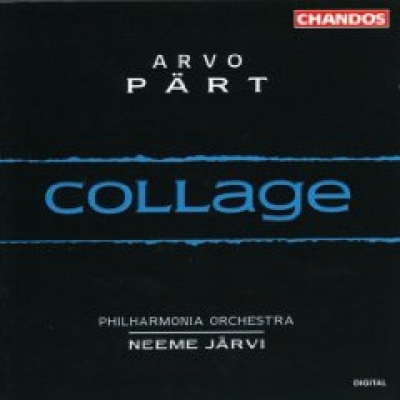
Collage
Collage is an eclectic assembly of pieces featuring Arvo Pärt, a composer who harnesses the pious ancestry of centuries long ago, while still challenging its convention with 20th century exploration. The earliest work featured here (written in the mid-'60s) is Collage Sur B-A-C-H, three exploratory passages written when Bach served as a sort of structural lifeline for Pärt while he was struggling to find his own voice. Strings, oboe, harpsichord, and piano cater to a short attention span by alternating between the ancient and the avant-garde. It's like an abstract sculpture made out of recognizable objects, disorienting as well as familiar. Having taken a fork in the road, the composer had since disowned these experiments, citing them as "extraneous." Some selections here, like Summa, visit the Estonian composer on more familiar ground: a cascade of strings, a snowfall of memory in gentle arpeggios. Conversely, Wenn Bach Bienen Gezüctet Hätte creeps up behind it, with the ghost of Shostakovich growling somewhere in the shadows through the voice of the Philharmonia Orchestra & Chorus. This album also features the 1983 premiere recording of Fratres, his most repeated composition. Here, Neeme Järvi's direction builds earlier and louder to a more deliberate level than the typical meditative approach that gets its point across with hushed intensity. Like wine, this piece became better with age, as performers and conductors took greater care with it. Symphony No. 2 falls out of the starting gate next; it's the uncoiling of a madman's neurosis, replete with squeaktoys and soundscapes slinking around the plucked strings and woodwind hiccups -- as contemporary and disjointed as anything the composer has done to date, mirroring the fragmented works of György Ligeti. Festina Lente follows in much the same manner as Summa, albeit more urgent and romanticized. Credo, the album closer, is the heightened culmination of all the sweetness and unrest that came before it...a tender whisper gives way to an orchestral thunderclap to the soul, next incorporating Bach's C Major Prelude as chaos looms ever closer, like a dark tidal wave approaching the shore in clusters of dissonant tone. By the halfway point of the piece, complete horror has overtaken the instruments, and the choir falls into the flames of percussion and brass wailing all around them. Only someone so deeply in touch with religion can deliver such a vivid depiction of Hell. In the aftermath, Bach's prelude returns like faint freckles of light, building to a triumphant crescendo that hovers with reverence and menace. Though somewhat misrepresentative of his body of work, this is a masterpiece for Arvo Pärt.
